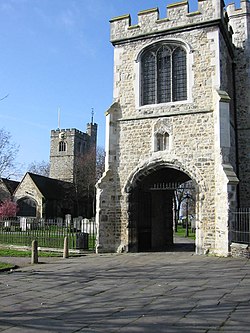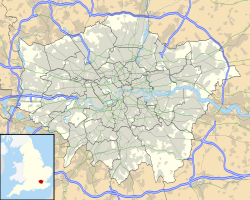 Barking Abbey: curfew tower with St Margaret's Church in background | |
| Monastery information | |
|---|---|
| Established | c. 666 AD |
| Disestablished | 1539 |
| Dedicated to | Saint Mary and Saint Ethelburga |
| People | |
| Founder(s) | Saint Erkenwald. Founded for his sister Saint Ethelburga |
| Site | |
| Location | Barking, London, London, England |
| Coordinates | 51°32′08″N 0°04′31″E / 51.535556°N 0.075278°E |
Barking Abbey is a former royal monastery located in Barking, in the London Borough of Barking and Dagenham. It has been described as having been "one of the most important nunneries in the country".[1]
Originally established in the 7th century, from the late 10th century the abbey followed the Rule of St. Benedict. The abbey had a large endowment and sizeable income but suffered severely after 1377, when the River Thames flooded around 720 acres (290 ha) of the abbey's land, which was unable to be reclaimed. However, at the time of the dissolution, it was still the third-wealthiest nunnery in England.[2]
The abbey existed for almost 900 years, until its closure in 1539, as part of King Henry VIII's Dissolution of the Monasteries. It had many notable abbesses including several saints, former queens and the daughters of kings. The abbess of Barking held precedence over all other abbesses in England.[2]
The ruined remains of Barking Abbey now form part of a public open space known as Abbey Green.[3] It is recognisable for its partially restored Grade-II* Listed Curfew Tower,[4] which features on the coat of arms of the London Borough of Barking and Dagenham.[5]
Barking Abbey is also notable because the adjacent St Margaret's Church, a grade I listed building dating back to the 13th century, was built within its grounds. The Abbey Ruins are used as a venue each May for outdoor classical concerts,[6][7] as well as an annual pilgrimage by members of the Eastern Orthodox Church.[8]
- ^ Cite error: The named reference
BLBwas invoked but never defined (see the help page). - ^ a b Cite error: The named reference
BHwas invoked but never defined (see the help page). - ^ Cite error: The named reference
AGwas invoked but never defined (see the help page). - ^ Cite error: The named reference
:0was invoked but never defined (see the help page). - ^ Cite error: The named reference
SMwas invoked but never defined (see the help page). - ^ "Barking Abbey Ruins". London Borough of Barking and Dagenham Council. Retrieved 14 October 2017.
- ^ "Mad for Barking". Evening Standard. Retrieved 14 October 2017.
- ^ "Pan-Orthodox Pilgrimage to Saints of Barking" Archived 27 February 2018 at the Wayback Machine, 23 April 2017, Orthodox London. Retrieved 27 February 2018.
